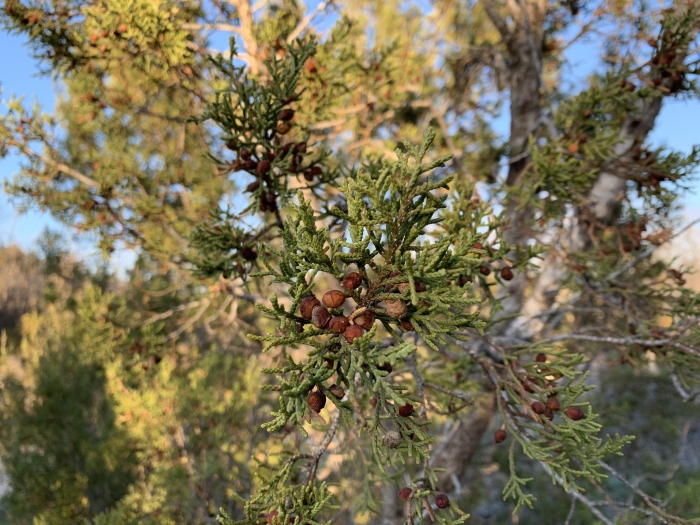Pinchot’s Juniper
(Juniperus pinchotii)
Pinchot’s Juniper (Juniperus pinchotii)
/
/

CK Kelly
CC BY 4.0
Image By:
CK Kelly
Recorded By:
Copyright:
CC BY 4.0
Copyright Notice:
Photo by: CK Kelly | License Type: CC BY 4.0 | License URL: http://creativecommons.org/licenses/by/4.0/ | Rights Holder: CK Kelly | Publisher: iNaturalist | Date Created: 2020-02-13T00:46:57Z |



















































Estimated Native Range
Summary
Juniperus pinchotii, commonly known as Pinchot’s Juniper, is an evergreen tree or large shrub native to the limestone hills, rocky outcrops, and open woodlands of the Southwestern United States and Mexico. It typically grows to 1–6 meters (3+1⁄2–19+1⁄2 feet) tall and is often multistemmed with a dense, rounded crown. The bark is pale gray and exfoliates in thin longitudinal strips, revealing an orange-brown underlayer. Pinchot’s Juniper is notable for its foliage, with juvenile needle-like leaves on young seedlings and scale-like adult leaves. The berry-like cones are orange-red, sometimes with a pale pink waxy bloom, and mature in about 12 months from pollination. Male cones are small, 3–4 mm long, and release pollen in the fall. Plants are usually dioecious, with male and female cones on separate plants, although monoecious individuals occur.
Pinchot’s Juniper is valued for its drought tolerance and its ability to thrive in poor, rocky soils, making it suitable for xeriscaping and naturalistic plantings. It is also used as a windbreak or for erosion control due to its robust root system. In cultivation, it prefers part shade to full sun and requires minimal water once established, thriving in well-drained soils. While generally low-maintenance, it can be susceptible to juniper blight and occasionally to infestations of bagworms. Gardeners should be aware that its dense growth habit can harbor rodents if not managed.CC BY-SA 4.0
Pinchot’s Juniper is valued for its drought tolerance and its ability to thrive in poor, rocky soils, making it suitable for xeriscaping and naturalistic plantings. It is also used as a windbreak or for erosion control due to its robust root system. In cultivation, it prefers part shade to full sun and requires minimal water once established, thriving in well-drained soils. While generally low-maintenance, it can be susceptible to juniper blight and occasionally to infestations of bagworms. Gardeners should be aware that its dense growth habit can harbor rodents if not managed.CC BY-SA 4.0
Plant Description
- Plant Type: Tree, Shrub
- Height: 3-18 feet
- Width: 6-10 feet
- Growth Rate: Moderate
- Flower Color: N/A
- Flowering Season: Non-Flowering
- Leaf Retention: Evergreen
Growth Requirements
- Sun: Part Shade, Full Sun
- Water: Low
- Drainage: Medium, Fast
Common Uses
Bird Garden, Deer Resistant, Fragrant, Hummingbird Garden, Low Maintenance, Rabbit Resistant
Natural Habitat
native to the limestone hills, rocky outcrops, and open woodlands of the Southwestern United States and Mexico
Other Names
Common Names: Pinchot Juniper, Redberry Juniper, Copper-Berry Juniper, Cedro, Tascate, Genévrier De Pinchot
Scientific Names: , Juniperus pinchotii, Juniperus texensis, Juniperus erythrocarpa, Sabina pinchotii, Juniperus monosperma var. pinchotii, Juniperus monosperma var. pinchotti, Juniperus pinchotii var. erythrocarpa, Juniperus pinchottii subsp. error,
GBIF Accepted Name: Juniperus pinchotii Sudw.